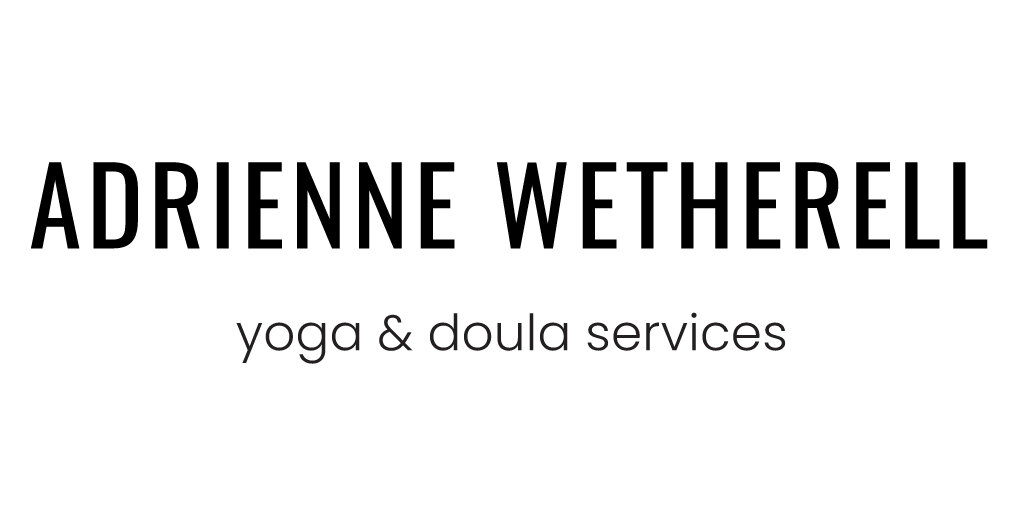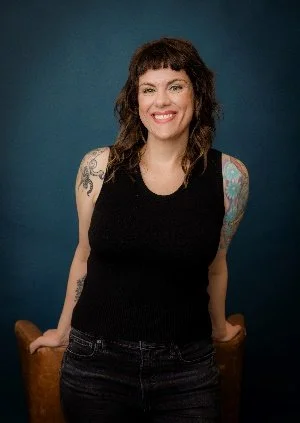New Parent Anxiety? Two Perinatal Therapists Answer Your Biggest Questions
Q&A with Dyneisha Dorrington and Olivia Scobie
Welcome Dyneisha and Olivia!
Q: Can you tell us a little bit about what you do?
Dyneisha: I am a mother of three in a beautiful, blended family. After a chaotic transition to motherhood, when the timing was right, I begun my Masters of Social Work which lead me to focus on perinatal and postpartum care within Black, Indigenous and People of Colour parenting communities which lead me to connect with Olivia at Canadian Perinatal Mental Health Training where I work as the Impact and Inclusion Coordinator. Both having stories of my own and having provided trauma counselling for many years, supporting parents, families and youth in trauma responsive and culturally sensitive practical ways holds great importance to me personally, professionally and academically. I am also the founder of a counselling and therapy service in private practice named Hazel and Teal Therapy.
Olivia: I offer social work counselling services in private practice and am the co-founder of Canadian Perinatal Mental Health Trainings. Right now, however, most of my days are spent working away on my dissertation!
Thank you for taking the time to new parent anxiety and postpartum mental health.
It’s such an important topic. Can you explain what a PMAD is?
Olivia: PMAD stands for Perinatal Mood and Anxiety Disorders. It’s applied to a range of mental health conditions, such as depression or anxiety, when the onset occurs during pregnancy and postpartum.
PMADs are more than just “baby blues” and impact about 20% of new parents. The symptoms vary for each mental health concern, but they can be overwhelming, scary, and confusing.
When I was a new mom (over 11 years ago now!), I remember feeling anxious and overwhelmed, but thinking maybe it was supposed to be that hard. When it’s your first (or only) baby, you really have nothing else to compare it to.
As a doula, I often work with clients who have anxiety, both during pregnancy and postpartum. Is postpartum anxiety a more common PMAD?
Olivia: Yes! While postpartum depression gets the most attention, postpartum anxiety is actually what I see more of in my practice.
Your reflection really resonates. Pregnancy and postpartum are times with a lot of transition and unpredictable outcomes, so a certain amount of anxiety feels like a normal response to all the uncertainty. This has created a cultural narrative that portrays many new parents - especially mothers - as overly cautious or irrationally worried about their baby’s well-being.
Unfortunately, this narrative minimizes real distress and makes it harder for people experiencing postpartum anxiety to recognize when they need support.
Q: What are some signs to look for?
Olivia: It can be tricky to tell what a “normal” amount of anxiety is for a new parent and what might be an anxiety disorder.
Some key signs of postpartum anxiety include:
Intrusive thoughts, often of something terrible happening to the baby, that feels distressing and hard to shake.
Excessive worry that feels hard to control. Often parents know what they are anxious about is unlikely, but they still can’t let it go or stop worrying about it.
Feeling constantly on edge, irritable, or overwhelmed.
Difficulty sleeping, even when exhausted and the baby is asleep.
Physical symptoms, like dizziness, nausea, muscle tension, or heart palpitations.
Q: What would you say to someone who may be having anxious thoughts?
Dyneisha: Try not to dismiss the experience or try to explain away symptoms and hardship as a typical part of motherhood.
Here are some ideas to provide support without identifying blame:
“It’s not your fault.”
“You don’t need to keep quiet about this, you are not alone. These thoughts are so common. Even though they are often not actively spoken about.”
“PMADS/intrusive thoughts do not make you a “bad” mom/parent.”
“This is your brain being overprotective, not a sign of something bad to come”
Q: What are common concerns or anxieties for a new parent to have?
Dyneisha: The dominant narrative of the joyful, expectant mother is widely recognized, but the reality of the experience is far more complex. It’s important for our understanding of early parenthood to include not only moments of joy and excitement but also common feelings of isolation, fear, and discouragement.
Here are a few examples of common concerns:
General worry, but worry that is not constant and encompassing
Concerns with others holding/watching baby
Wanting to be close to baby often
Concern about balancing roles
Concern about being able to meet your own needs (i.e., sleep deprivation)
Concerns with rapid hormonal changes
Indecisiveness on how baby will be fed
Q: If we see a new parent who is struggling with their mental health (as a loved one, family member, friend or doula) how might we initiate a conversation and create a safe space for them to talk about it?
Dyneisha: When you notice a new parent who is struggling with their mental health, especially in the early stages of parenthood, it's important to approach the situation with empathy and an understanding of the complexities involved.
Here’s some tips on how you can initiate a conversation and create a supportive space:
Acknowledge the Reality of Their Experience: Express that it's normal for this transition to be hard and that you're there to listen, not judge. A simple statement like, “I can imagine this time might be really overwhelming for you, and it’s okay if things aren’t perfect,” can help open the door to a deeper conversation.
Understand Cultural and Societal Expectations: Parenthood is shaped by family of origin and societal norms. There may be a cultural lens through which pregnancy, perinatal, and postpartum phases are viewed. This lens can create pressure to meet expectations that may not align with a new parent’s lived reality. Be sensitive to these cultural expectations and let them know that their unique experience is valid.
Create a Judgment-Free Zone: It’s crucial to build a space where the parent feels safe to share their struggles. Let them know that it’s okay to express not only the joys but also the difficulties.
Validate Their Feelings and Experiences: Many parents may feel like they "should" be adjusting well, even if their experience doesn't align with that expectation. This can lead to shame and feelings of inadequacy. Acknowledge these feelings and let them know they’re not alone in having them.
Ask Open-Ended Questions: Rather than offering advice right away, ask questions that invite them to share their experience. Open-ended questions like “How have you been feeling since the baby came?” or “What’s been the hardest part for you?” allow them to reflect on their emotions and struggles without feeling like they need to give a specific answer. This gives them space to articulate their feelings and open up about any challenges they’re facing.
Be Ready to Listen and Offer Support: Sometimes, just being there to listen without offering immediate solutions can make a huge difference. Acknowledge that their feelings are valid and let them know you’re available whenever they need to talk. Offer practical help, such as helping with a task or finding professional support if they’re open to it.
In all cases, I’d strive to balance honoring their autonomy while prioritizing safety. For me, this would mean including them in the process, giving them as much control as possible, and being completely transparent about my actions.
Loved ones can play a critical role in helping someone struggling with a PMAD to access care, and thankfully most PMADs don’t require forced intervention, but rather gentle encouragement and practical support. Many parents fear being judged or losing control over their parenting decisions, so approaching them gently without pressure is key.
When someone is struggling with a PMAD, they may not always recognize how much they’re suffering or know how to talk about it. Loved ones can help by initiating a compassionate conversation with the person who is struggling to better understand their experiences and be direct about their concerns:
“I’ve noticed you’ve been feeling really overwhelmed lately, and I want you to know that I’m here for you. Can we talk about how you’re doing?”
“I can see that you are carrying a lot right now and I’m worried it’s more sleep-deprivation. You don’t have to do this alone. I looked up the signs of postpartum depression and anxiety. Can we look at this together?”
“It seems like you are having more panic attacks as each day passes. I don’t always know what to do when you are upset, and I know I get it wrong sometimes. But I’m here and I’m listening. Can you tell me more about what you have been experiencing in the last few weeks?
Q: Can you share any resources people can access if they need support?
Postpartum Support International
Q: How can we connect with you? Is there anything you are working on that you would like to share with us?
Dyneisha: I offer counselling services from pregnancy, parenting and beyond at Hazel and Teal Therapy.
Olivia: I have been hidden away working on my dissertation, so I don’t have anything to share just yet – hopefully next year!
About Dyneisha & Olivia
Dyneisha Dorrington (she/her) RSW, MSW, CC-PMH
Dyneisha is social worker who is deeply aligned with holistic and integrated approaches to mental health, emphasizing voice, choice and supportive collaboration. Driven by a commitment to creating high-quality, inclusive, and practical therapeutic support helping to bridge gaps in access to standardized therapy. Dyneisha’s approach brings her lived experience to the counselling relationship and a strong belief in collaborative, individualized mental health care, fostering a space in which tears, laughter, and genuine unburdening can happen.
Dyneisha is currently excepting new virtual clients. If you’d like to connect, you can reach out to her here:
Olivia Scobie (she/her) MSW, RSW, MA, PH.D Candidate
Olivia is a social worker specializing in perinatal mood, reproductive trauma, and parental mental health. She is completing her PhD in Health Policy and Equity, and talks too much about her research about the reproductive trauma experiences of 2SLGBTQ+ birthers. Most importantly, she believes in eating dessert every day, telling your story, and barrier-free access to mental health support.
Links







